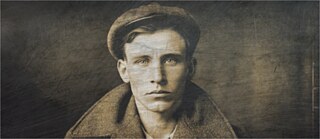Bremerhaven Shore Leave and a Running Stitch

How a run in a young woman’s stockings changed the life of a U.S. Navy officer. – Edward Mazurkiewicz recounts the stages of his life, cultural encounters, and how Bremerhaven became his “Home Port”.
I am an American citizen living in Geestland, Germany near the ocean port city of Bremerhaven, Germany, my “Home Port”. I was born in Reading, Pennsylvania June 5, 1940. I have lived and worked in several locations beyond Reading such as in Brooklyn, New York, Fort Pierce, Florida and Washington, D.C. in the USA and overseas in Bremerhaven, Germany, Naples, Italy, and Rotterdam, Netherlands. Many friends and associates have asked me: “What makes you want to leave the USA to live in Bremerhaven?” With a smile on my face, I like to say that I like eating herring sandwiches so much.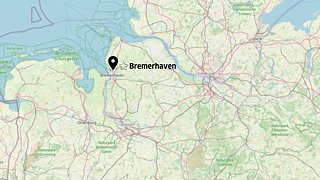
The city of Bremerhaven is located in the northwest of Germany – where the Weser River flows into the North Sea | Map: OpenStreetMap.org
A U.S. Navy officer at sea
At that time, I was then faced with completing my military obligations, which was required of all young men over the age of 18. Rather than being inducted into the Army as an unassigned soldier for two years of duty, I voluntarily joined the US Navy, to see the world. As a college graduate, I was eligible to attend the Officer Candidate School to be commissioned as a US Navy officer. Not long afterwards, I was on the train to the US Naval Training Center in Newport Rhode Island. I remember that night well, October 16, 1962 when President J. F. Kennedy issued orders for a naval blockade of Cuba. After completing the school, I was assigned to the USS Neosho, a military oil tanker that had the mission to refuel other military warships while at sea.While mostly at sea, with long working hours day and night, we did have time for port visits and rest and relaxation. We made port calls at Curaçao, Cuba, Spain, Italy, Greece, and Turkey. The most amusing time that I can recall was a visit to Barcelona in Spain. As was the custom, our ship’s Captain made a diplomatic visit to the Spanish Consulate there. He returned saying that a member of the Spanish royal family would like to meet an American officer. Of course, all of the married officers said that they were not eligible and frowned upon the thought of meeting a Spanish woman sight unseen. I was 23 years old, single, and the most junior officer on board and so I was “given the mission” to escort the lady for the evening. Instead of meeting an elderly spinster, as we all anticipated, my date turned out to be a young and attractive woman who was a graduate from the UCLA University in California. Of course, I was stunned and overwhelmed, and I was probably a dull ambassador for the U.S., and my ship. We dined at a fondue restaurant, her choice, and it did not cost me a month’s pay.
My next tour of duty in 1965 was an assignment to the USNS Wm. O. Darby, a troop and passenger ship that carried soldiers and families including women and children between Brooklyn, New York and Bremerhaven, Germany. It was like a shuttlebus run, back and forth, Brooklyn to Bremerhaven and back to Brooklyn again, turnaround time about 56 hours in port, 10 days eastbound with following seas and 12 to 15 days westbound with pounding waves and seasick passengers headed westbound to the USA. On some of these voyages, I witnessed the excitement of young newlywed couples, German brides brimming with hope and excitement on their way to a new life in the USA. Conversely, I observed single, determined German women, some with children, returning to their former homes in Germany.
Arriving in Bremerhaven
Arriving in Bremerhaven, this was the first time that I ever stepped foot onto German soil. I was half expecting to see Bremerhaven as an old city still under construction from the war years. But what a surprise! Bremerhaven was rebuilt and the streets were full with people going to or from their jobs and people shopping. Shoppers downtown Bremerhaven were always dressed in their best clothes, like it was a Sunday. Men were seen tipping their hats to women when approaching them on the sidewalks. That really impressed me the most. And Bremerhaven, like my hometown Reading, had clanging streetcars, a theater and movie theaters, big shopping streets with bars and restaurants, local “mom and pop” grocery stores and corner bars with beer and pretzels. Everything that I saw reminded me of things as they used to be in Reading as a child 20 years earlier. I felt at home! I think my first German words were “I want a beer and a bratwurst, please”.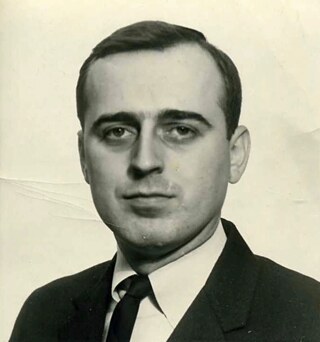
Edward Mazurkiewicz, 1966 | Photo: private
A “runner” and love at first sight
While with friends downtown, looking for a beer and bratwurst, we were intrigued by two young women stopping passers-by and asking questions, and seeming to be distressed. We approached them and asked if they needed assistance. It turned out that one of the women had a “runner” in her stockings. All the shopping stores had just recently closed for the day, and she needed coins for a stocking automat in front of a clothing store. My friends and I had enough small change to assist. That’s when it happened: we both looked at each other – it was love at first sight. Her name is Waltraud, and we are still happily married today. We exchanged mailing addresses and by writing letters we always tried to meet each other every time the ship returned to Bremerhaven.After a year, I finished my commitment for military duty. I decided at the time that military life, with frequent deployments, was not the ideal for a partnership and raising a family. I resigned my commission as an officer and returned to Bremerhaven as a civilian tourist. I found employment in the port of Bremerhaven as a freight forwarder, and later with the US Navy on the military installation at Bremerhaven. Waltraud and I got married in the Bremerhaven Memorial Church in August 1968.
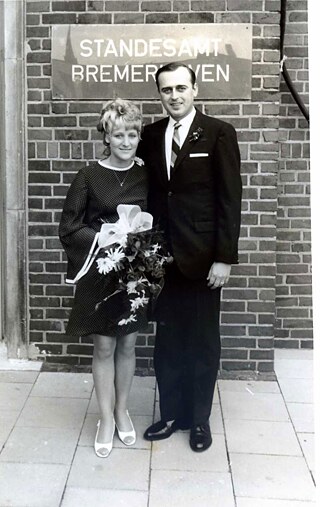
Wedding – August 1968 in front of the registry office in Bremerhaven | Photo: private
Moving back and forth across the Atlantic
My new career with the U.S. Department of Defense required me, and my young family, to return to the USA, or lose my job. This was a very critical turning point in my life: stay and start all over again, unemployed, or return to the USA. I saw and felt the traumatic stress in her eyes: I promised that if we should leave, I would do everything possible to return to Bremerhaven. I was rehired with my Navy logistics agency in Washington, D.C. Thereafter I would always look for a new posting overseas that would bring me closer to Bremerhaven again. I was eligible again to work overseas and found a job to manage the US Navy Fleet Freight Center in the port of Naples, Italy.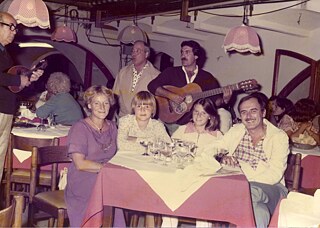
Naples – Mazurkiewicz family in a restaurant | Photo: private
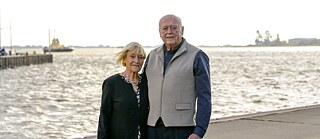
Edward Mazurkiewicz with his wife Waltraud | Photo: Manja Herrmann
P.S. I like herring!
Edward Mazurkiewicz wrote his own story and provided old photos; the current photos were taken by Manja Herrmann.
Acknowledgements
The editors would like to thank the German Emigration Centre Bremerhaven – in particular Hilka Baumann – for their active support, without which this article would not have been possible.


